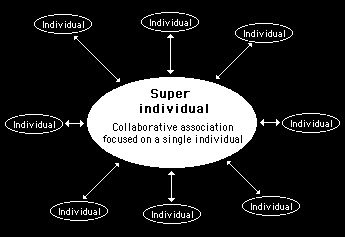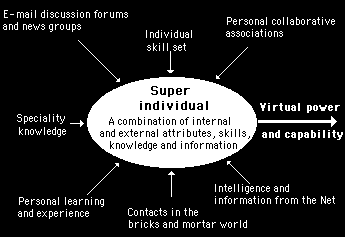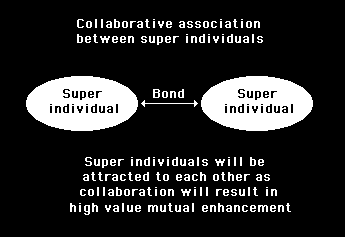
Chapter 4
Searching for an opportunity
Becoming a super individual
By creating a group of useful contacts around themselves, an individual will effectively become more knowledgeable, capable and aware. Through the exchange of information and through collaborative associations, they can enhance personal abilities, perhaps to the point where they become super individuals: able to vastly increase their natural capabilities. This is illustrated in figure 4.3.

Figure 4.3
Through creating a group of personal associations where there is information exchanges and implicit understandings of mutual collaboration, an individual can effectively become a super individual.
By building up a virtual community of contacts whom they are exchanging useful information and knowledge, an individual can effectively become a super individual because they can draw on the knowledge and skill sets of this personally created community. The bonding is through the mutual exchange of information, knowledge and help.
In the world of bricks and mortar, there are practical limitations to the number of contacts that can be maintained and the extent of information that can be readily accessed and exchanged. In the world of the Internet, the ease and low cost of maintaining contact with many others allows a wide variety of information and knowledge sources to be established. Figure 4.4 illustrates the make up of a typical super individual who makes full use of the Internet. Their personal power and capability are greatly enhanced through a number of different channels.

Figure 4.4
An individual can become a super individual through opening up a wide range of information sources which enhance their own abilities and knowledge
An individual, taking full advantage of the Internet to enhance their knowledge and capabilities, will effectively gain power and influence. In the world of bricks and mortar such a strategy would be treated with suspicion because nearly all associations are connected to a specific group where there is competition in a some kind of pecking order. This sees everyone, even close colleagues, as potential rivals or competitors.
In groups centred on individuals, such pecking orders do not exist. The bonding isn't about fitting into a niche in a hierarchy, it is about exchanging value. This also explains why loyalty and trust are not necessary in such groups: people bond and collaborate with each other because of the value they can give to each other.
If it is assumed that everyone acts in their own best interests, people will endeavour to acquire the most knowledgeable and capable persons to be amongst their group of personal contacts. This will put the super individuals, who are making effective strategic use of the Internet, at a distinct advantage as they will be potentially more valuable as associates. The consequence would be that those who are most efficient at turning themselves into super individuals will be attracted to each other as is illustrated in figure 4.5.

Figure 4.5
Super individual will be attracted to form bonds with each other if they are each seeking to create a personal community of valuable contacts.
In hierarchical organisations, obtaining advantage by creating such a group of close associates is often treated with suspicion and even jealousy. Efforts are often made to compromise these associations or break them up.
In the environment of the Internet, rather than being resentful of others forming personal associations that enhance their knowledge and capabilities, it is strategically more sensible to encourage everyone to do this. This is because rivalry is less of an issue in the massively connected world of the Internet; it is more important that you have powerful and knowledgeable friends and associates.
For this reason, people who create cafes and strategic associations try to encourage all of their contacts to do the same. The more connected they become the more valuable will be the association.